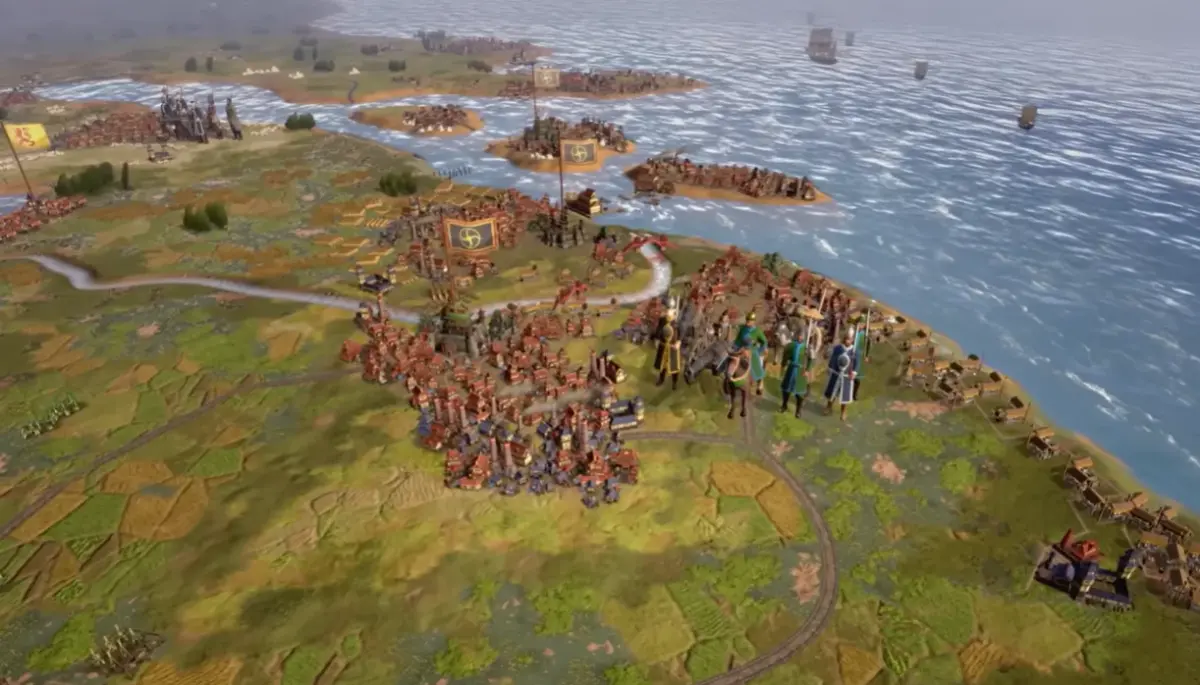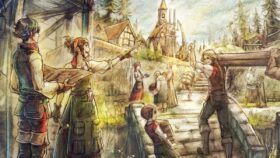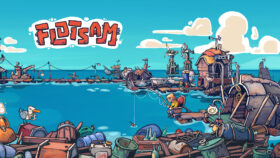If you’re a regular player of Paradox games, you may have been asked once or twice by a friend how to get into them. Everyone has a different answer to this question, with some preferring the more character-driven Crusader Kings series and others opting for the more focused scope of Hearts of Iron. Now, however, we can at last all give the same answer – don’t start with Europa Universalis V.
Europa Universalis IV, funnily, was probably the most common answer to that question until now, and the first thing to note about this game is that it could scarcely be any different from its predecessor. EU4 was a map-painter, and expansion in EU5 is decidedly trickier thanks to the never-ending balancing act of managing internal interests within your own country.
Even taking over a couple of Irish counties as Gaelic Scotland – the same religion and with strong cultural affinity – had proved so potentially damaging to the stability of the realm that I eventually palmed it off to a client state. In EU4 I’d be planning a vast, intercontinental empire at this point in the game. In EU5 I dream about owning Berwick-upon-Tweed.
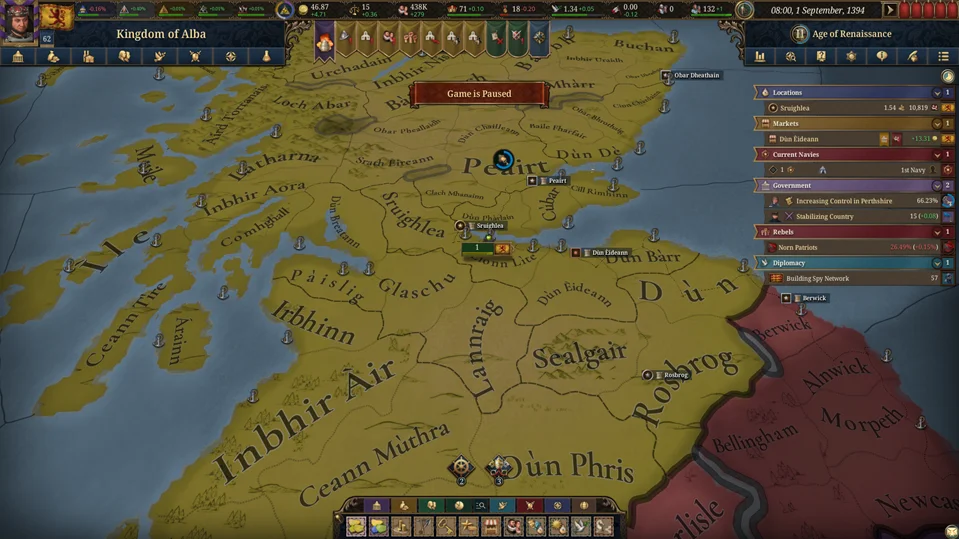
My one civil war in EU5 was a tough challenge, happened because of neglected material conditions, and took me by surprise – three criteria that make for an excellent challenge and which could never have been the case in EU4. And it’s the material conditions that really drive the game.
The war happened due to dissatisfaction among my nobles, in turn fed by their inability to access vital luxury goods in the market due to trade constraints. I’d focused on providing more basic needs for construction and development over silk and spices, and while it wasn’t enough to cause a war itself, it was enough to leave a simmering resentment, which turned a minor squabble into open warfare.
In my Scotland campaign, I was able to mobilise an enormous amount of my population in times of war, as was the case historically. In EU4, this would probably be represented by a country-specific modifier for Scotland, or random events. In EU5, it’s purely through materialism and mechanics – my heavily populated areas are quite close together and easy to control, and those distant from the capital are full of tribes rather than settled peasants – difficult to tax but ready to go at a moment’s notice in a scrap.
This move towards doing everything via mechanics is commendable, taking a radically different approach from the one used at the end of the previous generation of Paradox games like Hearts of Iron IV and EU4, which were led by mission trees. It’s enormously impressive, but the lack of being able to guide countries down historical paths by design could potentially pose some problems.
In pre-release builds, the AI came in for heavy criticism, with players universally finding that other empires struggled to expand or even colonise, mostly sitting around passively for the entire game. That appears to have been improved since, but it will doubtless take time to find the correct balance. Thankfully, though, it’s an issue that can be fixed by patches rather than DLC.
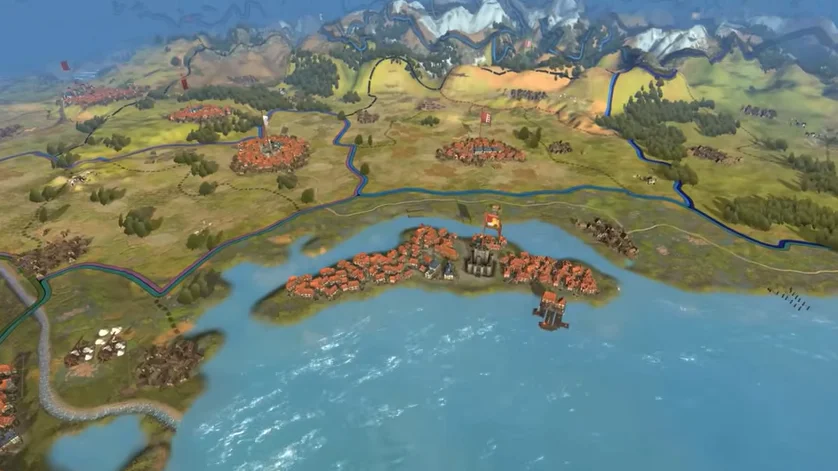
A passive AI can be poor for historical immersion, but it’s not helped by the fact that the game starts at a far earlier date than EU4, which has few benefits but several problems. While we do get to see the full transformation of European politics from the medieval to the modern, it comes with several problems. Two of the largest and most dominant countries of the period, Ming and the Ottomans, either haven’t formed or remain small. In games where they don’t emerge as the all-powerful empires they were in real life, a lot of the feel of a historic simulation will be lost.
Secondly, with the reformation and colonization being so far from the start date, many countries in Europe will find themselves with a whole lot of sitting around to do before much of any interest happens. But perhaps the worst is the imminent arrival of the Black Death.
This is something that the game does indeed lend enough weight to – prepare to lose a third or more of your population – but not enough flavor. Unlike in Victoria 3, we’re not running pensions or a healthcare system, so half the population dying off demolishes your tax base without having a comparable effect on how much the country actually costs to run. But while the deaths can certainly be felt on the balance sheet, we don’t see the fear or despair that would be apparent in a character-driven game like Crusader Kings.
It also lays bare one of the main problems with historical grand strategy games as a whole – the player knows something is going to happen, be it the Molotov-Ribbentop pact, the existence of the Americas, or the imminent scramble for Africa, and can position themselves accordingly. This is a fundamentally insurmountable problem in many ways, and can either be gamed or have the player left as a powerless spectator, and it taking place in the early game is not beneficial from a balance point of view.
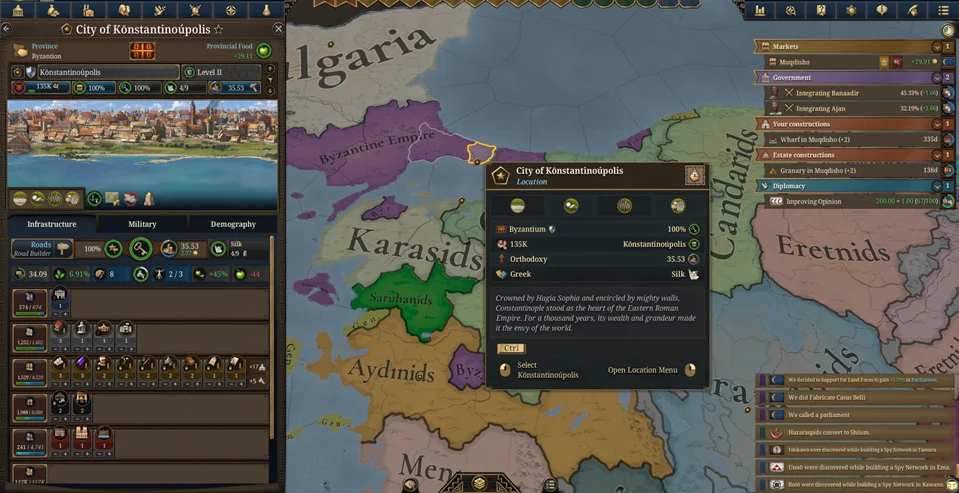
There are other issues – the lack of some minor but valuable features, like being able to tell an ally to prepare for war, can be frustrating. The population demanding wheat and rice when they have perfectly good other grains is even more annoying. And aside from being too passive, I’ve also seen the AI surrender after losing territory in a war with an undefeated army still in the field.
If you’re a Paradox veteran, there’s one game in the back catalogue which EU5 is by far the most similar to, and it’s not its predecessor – it’s Victoria 2. In almost every way, really, but primarily the awe inspired by seeing such a complex machine ticking away, and the sudden, violent swings on the financial ledger that appear to completely lack rhyme or reason.
For all the impressive mechanics, though, the simple question is: does it produce the stories? Paradox games are always at their best when the country is simply enjoyable to be in charge of, even if the player sat within their own borders for the entire save. EU4 was not like this at all. It was the epitome of “the journey is the reward”, with every save finding you striving to take control of some empire or region and then finding little to do once you’d taken it over. By contrast, plotting to seize the throne in Crusader Kings is enjoyable, but so is actually being the King once you’ve gotten there.
Does EU5 pass the test? The simple answer is: yes, with flying colours. The more complex answer is that it does tell stories, and very interesting ones at that, but you have to be the sort of person who finds stories about the relationships between economics and material conditions interesting, rather than those between human beings.
I find it difficult to imagine a world where it isn’t considered the greatest historical strategy game of all time
Even EU5’s detractors are in broad agreement – this will be a great game. I’m inclined to agree – in fact, I find it difficult to imagine a world where it isn’t considered the greatest historical strategy game of all time at some point. It’s far from a bare bones release, but that point is not now.
However, if merely saying that it will be a great game sounds like faint praise, and a warning to pick it up on sale after a few DLC have arrived, it isn’t. It’s already a great game now, and a truly fascinating simulator. No doubt more interesting things will be built from it, but the core mechanics are the star of the show, and they’re engaging, well-designed, and lack the repetitive grind of even some recent entrants like Victoria 3. This is a game about carrying out long-term plans and reacting to the many crises that threaten to divert them, and it does it very well, whether you’re playing as Spain or Mogadishu.
If you’re a newcomer to Paradox games, or liked one series but not others, then the advice to wait for more DLC might be sound. You’ll still have fun, and the fiddlier aspects of managing your country can be left to the AI, but there’s no doubt that the game could do with a bit more flavor and have some mechanics ironed out. There are definitely a few cases for extra options for automation, as well as some better feedback to the player, too.
If you’re a true die-hard, though, there’s no two ways about it – this is the game you’ve been dreaming of. Paradox have committed an act of fan service on an egregious scale here, with every design decision taken in favour of complexity, depth, and difficulty, as perennially demanded by their fanbase. The simulation that has resulted from those decisions is a staggering achievement. If that’s up your street, welcome to your new life.
